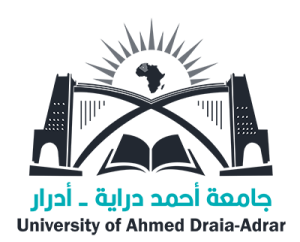Applied Didactics is splitted into a Formal Lecture and a guided session (TD). In this module, students will learn about the different teaching methods and approaches that are important in English language teaching.
- معلم: Reda BOUKLI-HACENE
Didactics and Interculturality is assigned to Master 2 students as a Formal Lecture.
"Intercultural education refers to the phenomenon of interaction between people, religions, cultures,
speakers of different languages who have different opinions and views. This education is fundamental
in addressing cultural differences (principles, values, traditions etc.) as well as other differences
(gender, social, economic differences, etc.).
Intercultural education refers “to education training people able to appreciate different cultures, which
are set in a traditional society and therefore able to accept to evolve in contact with these cultures, so
that this diversity could become an asset enriching the cultural, social and economic life of the
environment". Intercultural education implies the presence of members of different cultures, namely education of
interpersonal relationships.
The main objectives of intercultural education are the following:
enhancing the efficiency of intercultural relations;
increasing tolerance and acceptance towards those who are different;
training people to make them perceive, accept and respect diversity for mediating social
relations.
In various fields some differences can be attested:
language of communication;
religion;
social practices of communication;
ways of relating;
clothing;
diet;
leisure
traditions, norms and habits;
physical appearance and various disabilities etc."
(Chiriac & Panciuc, N.A., https://conference.pixel-online.net/NPSE/files/npse/ed0004/FP/1426-NTST861-FP-NPSE4.pdf)
"Nowadays, it is a widely
known fact that teaching
and learning a foreign language cannot be reduced to the direct
teaching of linguistic skills like phonology, morphology, vocabulary, and
syntax. The contemporary models of
communicative competence show that
there is much more to learning a language, and they include the vital component of cultural knowledge and
awareness (Bachman 1990; Council of
Europe 2001). In other words, to learn
a language well usually requires knowing something about the culture of
that language. Communication that
lacks appropriate cultural content
often results in humorous incidents, or
worse, is the source of serious miscommunication and misunderstanding.
According to Kramsch (1993, 1), culture “is always in the background,
right from day one, ready to unsettle
the good language learners when they
expect it least, making evident the
limitations of their hard-won communicative competence, challenging their
ability to make sense of the world
around them.”" (Chlopek, 2008)
- معلم: Reda BOUKLI-HACENE
Social Psychology is assigned as a Formal Lecture to Master 2 students.
- It is the scientific study of how people's thoughts, feelings, beliefs, intentions and goals are constructed within a social context by the actual or imagined interactions with others.
It therefore looks at human behavior as influenced by other people and the conditions under which social behavior and feelings occur. Topics examined in social psychology include: the self concept, social cognition, attribution theory, social influence, group processes, prejudice and discrimination, interpersonal processes, aggression, attitudes and stereotypes.
(retrieved on 01/12/2022, https://www.simplypsychology.org/social-psychology.html)
- Social psychology is the study of how individual or group behavior is influenced by the presence and behavior of others.
The major question social psychologists ponder is this: How and why are people’s perceptions and actions influenced by environmental factors, such as social interaction?
In seeking the answer to that basic question, researchers conduct empirical studies to answer specific questions such as:
- How do individuals alter their thoughts and decisions based on social interactions?
- Is human behavior an accurate indication of personality?
- How goal oriented is social behavior?
- How does social perception influence behavior?
- How do potentially destructive social attitudes, such as prejudice, form?
For example, have you ever noticed you act and think differently among people you know than you do among strangers? Have you ever wondered why that is? Social psychologists spend their careers trying to determine the answers to questions like these and what they might mean.
(retrieved on 01/12/2022, https://online.maryville.edu/online-bachelors-degrees/psychology/resources/what-is-social-psychology/ )
- معلم: Reda BOUKLI-HACENE
Research Methodology is about how to do research, how to write about it, and finally how to present it. The lectures are based on Kothari's book Research Methodology; the split into 06 chapters starting with the meaning of the word "research" itself. The uploded videos will explain this module in a more practical way. For any questions, please feel free to email me at bouhania.bachir@univ-adrar.edu.dz
- معلم: Bachir Bouhania
